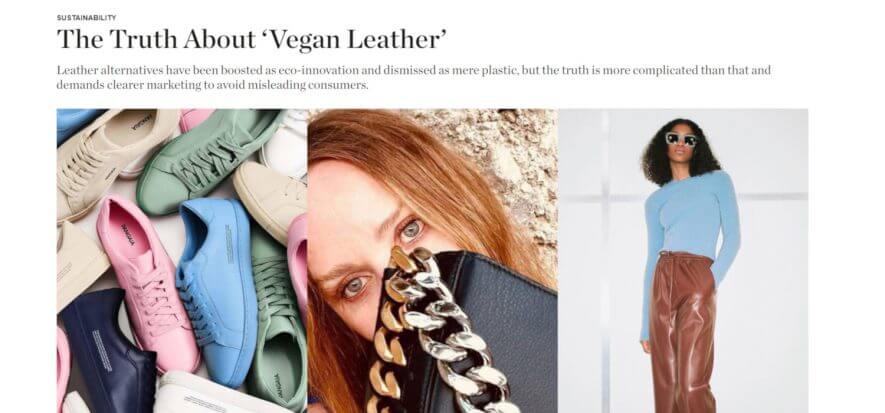Let’s put it this way: vegan marketing is liked by vegans when it’s used as a blunt instrument against traditional industries. Yet, they no longer appreciate it that much when it’s aimed against them. The analysis by Business of Fashion of the concerns of producers and users of alternative materials is a clear example of the tensions that run within the veg world. Because when it’s about taking market share from tanneries, the radical green all agree, and with ease they make statements against leather. But then, when the manufacturers of alternative materials compete for their own spot by stepping on one another with slogans and misleading labels, they recognize that vegan marketing is an issue.
There needs to be clarity
So, we start with Amanda Parkes statement (head of innovation for the brand Pangaia, maker of sneakers). They try, she says to BoF, to be transparent with consumers. Or rather explain the make of the materials they use, their impacts on production, the possibility to recycle or not. The problem is that not all competitors behave the same way. Rather, they exaggerate by putting “plant-based” and “vegan” labels on their goods, without actually saying what material has been utilized to make the shoes’ upper. “A range of solutions”, says BoF, “often made 100% with plastic”.
The paradox
For years (decades), the tanning segment asks national and international laws that protect the use of the term “leather”. In fact, the first trick used by vegan marketing is to illegitimately use the term to project a certain image. The paradox is that, now, even the green society asks the market to stop with (misleading) labels such as Pleather, vegan leather, eco-leather and other. The Textile Exchange for example, is asking them to stop: “Leather should only be used as a term when the material is a byproduct of animal processing”. This problem, says Sydney Gladman, scientist with the Material Innovation Initiative, is that producers of alternative materials don’t know what else to do. “Brands are incapable of selling their new materials in a transparent and trustworthy way”.
Meanwhile, the market keeps going
More and more individuals expect increased clarity. Clarity that is capable of going beyond slogans and key words. The risk is that the vegan bubble will eventually burst: “It’s what we really do not need – concludes Suzanne Lee, CEO of consulting firm Biofabricate -, it’s a new generation of materials that, in the last 10 years, hasn’t really proved itself an improvement. Or worse, it has had unforeseen impacts, many of which affect or ruin the product’s life”.
Read also:











